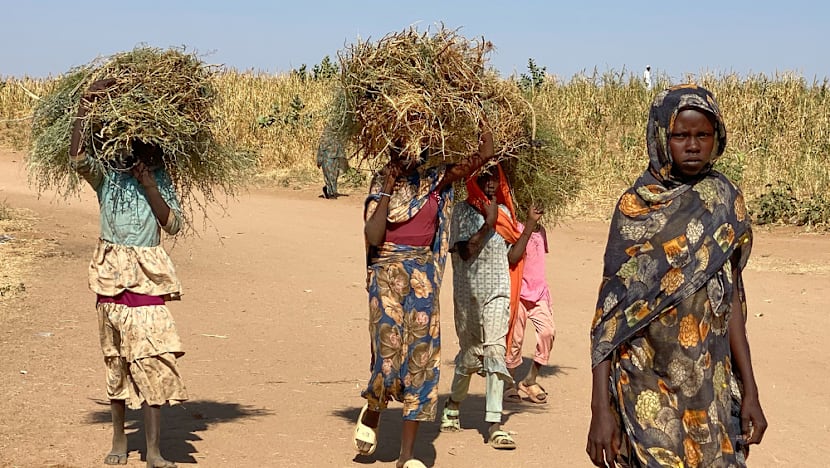World
Survivors Describe Atrocities as El-Fasher Falls to RSF Control

Survivors fleeing the city of El-Fasher in Sudan have recounted harrowing experiences of violence, including the execution of children and the separation of families. This turmoil has intensified following the consolidation of control by the Rapid Support Forces (RSF) after an 18-month siege. With the situation described as “apocalyptic” by Germany’s Foreign Minister Johann Wadephul, tens of thousands of residents remain trapped amidst escalating violence.
Zahra, a mother of six, shared her ordeal via satellite phone from Tawila, revealing that RSF fighters took her teenage sons as she attempted to escape. “I don’t know if my son Mohamed is dead or alive. They took all the boys,” she said, highlighting the traumatic impact of the conflict on families. Another survivor, Adam, witnessed the brutal killings of two of his sons, aged 17 and 21, in front of him, amplifying the sense of despair among those fleeing.
Reports of mass executions, sexual violence, and kidnappings have emerged following the RSF’s capture of El-Fasher, the last city in Darfur held by the army. According to the United Nations, more than 65,000 people have fled since Sunday, but many remain in peril, with organizations like Doctors Without Borders warning that numerous individuals may be “dead, captured, or in hiding.”
Evidence of Ongoing Violence
Recent satellite analysis conducted by Yale University’s Humanitarian Research Lab identified at least 31 clusters of human bodies around El-Fasher between March 10 and 15, 2024. The analysis concluded that “indicators that mass killing is continuing are clearly visible.” In response to accusations of mass killings, the RSF, which traces its roots to the Janjaweed militias implicated in genocide in Darfur two decades ago, has denied orchestrating such actions but acknowledged arresting several fighters for “abuses.”
The ongoing conflict has resulted in tens of thousands of deaths and has displaced nearly 12 million people, leading to what has been termed the world’s largest humanitarian and hunger crisis. The fall of El-Fasher grants the RSF control over all five state capitals in Darfur, effectively dividing Sudan in two. The Sudanese army, supported by nations including Egypt, Saudi Arabia, Iran, and Turkey, maintains control over the north and east of the country.
“The scale of the violence is truly horrifying,” stated Johann Wadephul, emphasizing the urgency of the humanitarian situation in Sudan. He declared, “Sudan today is facing the greatest humanitarian catastrophe on Earth,” reflecting the international alarm surrounding the escalating violence and suffering in the region.
As the situation continues to evolve, the plight of those affected remains critical, with many families like Zahra’s left in uncertainty and anguish. The international community is urged to respond to this escalating crisis to mitigate further suffering and loss of life.
-

 Lifestyle3 months ago
Lifestyle3 months agoHumanism Camp Engages 250 Youths in Summer Fest 2025
-

 Sports3 months ago
Sports3 months agoDe Minaur Triumphs at Washington Open After Thrilling Comeback
-

 Business4 months ago
Business4 months agoKenvue Dismisses CEO Thibaut Mongon as Strategic Review Advances
-

 Sports4 months ago
Sports4 months agoTupou and Daugunu Join First Nations Squad for Lions Clash
-

 Top Stories4 months ago
Top Stories4 months agoColombian Senator Miguel Uribe Shows Signs of Recovery After Attack
-

 World4 months ago
World4 months agoASEAN Gears Up for Historic Joint Meeting of Foreign and Economic Ministers
-

 Business4 months ago
Business4 months agoOil Prices Surge Following New EU Sanctions on Russia
-

 Entertainment3 months ago
Entertainment3 months agoDetaşe-Sabah Violin Ensemble Captivates at Gabala Music Festival
-

 Health3 months ago
Health3 months agoNew Study Challenges Assumptions About Aging and Inflammation
-

 Entertainment3 months ago
Entertainment3 months agoBaku Metro Extends Hours for Justin Timberlake Concert
-

 Business4 months ago
Business4 months agoU.S. House Approves Stablecoin Bill, Sends to Trump for Signature
-

 Top Stories4 months ago
Top Stories4 months agoRethinking Singapore’s F&B Regulations Amid Business Closures









